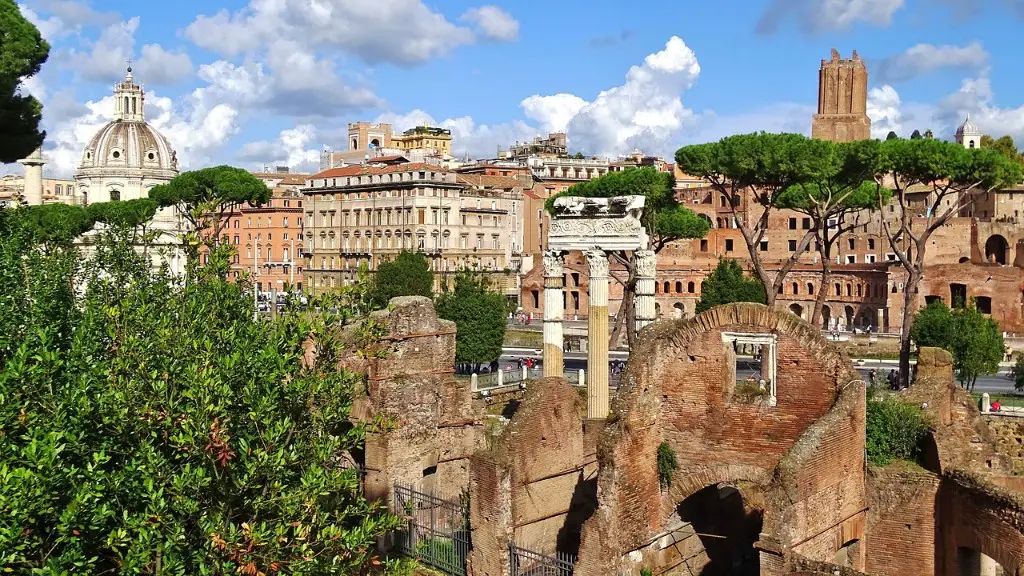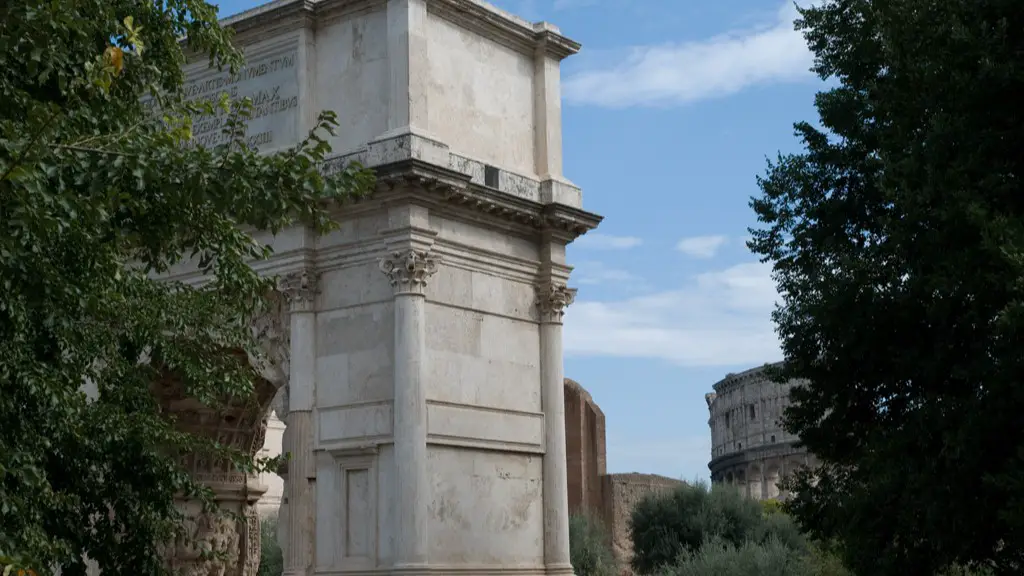Biography of Julius Caesar
Julius Caesar was born in Rome in 100 BCE and went on to become one of the most important political figures of the ancient world. He was a military leader, statesman, and orator who prospered in the chaotic political environment of Rome. Caesar quickly rose through the ranks of the Roman senate and became a skilled political negotiator. He led a successful military campaign against all of Rome’s rivals and won several important battles, extending Rome’s power and influence far beyond the city. His political reforms and policies also had profound effects on the Roman political system, ushering in a new era of prosperity and stability. Caesar’s reforms were eventually recognized by the Roman senate, who awarded him the title of “dictator for life”. Caesar was assassinated in 44 BCE by a group of senators who feared his growing political power.
Biography of Mark Antony
Mark Antony was one of the most powerful Roman politicians in the 1st century BCE. He was a close friend and ally of Julius Caesar and was instrumental in Caesar’s rise to power. Following the death of Julius Caesar, Antony became the leader of the Roman Republic and used his military and political skill to extend Rome’s reach. He formed an alliance with the Egyptian Queen Cleopatra and together they strengthened the Roman Empire. In 31 BCE, Antony and Cleopatra led a huge armada against the forces of Octavian at the Battle of Actium. The battle ultimately resulted in Antony’s defeat and Cleopatra’s death, and marked a turning point in Roman history.
Biography of Cato the Elder
Cato the Elder was a Roman statesman, orator and historian who played a key role in the development of ancient Roman law. He was a member of the Populares faction of the Roman Senate, and was known for his straight-forward, no-nonsense approach to discourse. He advocated for traditional Roman values and laws, which earned him the nickname “Cato the Ancient”. He was also a proponent of fiscal conservatism and fiscal reform, and was involved in the establishment of the Lex Porcia in 95 BCE, which is one of the earliest forms of democracy in the Roman Republic. He died in 149 BCE and his legacy as one of Ancient Rome’s great statesmen still lives on today.
Biography of Cicero
Cicero, was a leading figure in the Roman Republic and one of the most important Roman philosophers and politicians of the 1st century BCE. He was a noted orator and a practicing lawyer, and became famous for his eloquence and the principles of democracy which he stood for. Cicero was known for his intelligence and humor, and was an expert on the theories of Epicureanism, Stoicism, and Epicureanism. He was also a political theorist who articulated the concept of a republic, introducing it to the Romans. He was eventually executed in 43 BCE for his opposition to the rule of Julius Caesar, but his legacy still lives on today in the form of his writings, which are considered some of the most important in ancient political thought.
Biography of Scipio Africanus
Publius Cornelius Scipio, more commonly known as Scipio Africanus, was a Roman general and statesman during the Second Punic War. He was the first Roman to be given the title “Africani”, which was a reflection of his heroic victory against the Carthaginian leader Hannibal in 202 BCE. Scipio was renowned for his tactical and strategic genius, and was known for his innovative use of light infantry and cavalry as well as his ability to win the hearts of the enemy. He died in 183 BCE, but his legacy and achievements live on to this day. He is widely regarded as one of the greatest military commanders in all of Roman history.
Biography of Sulla
Lucius Cornelius Sulla was a Roman statesman and military leader who rose to prominence during the 1st century BCE. He aided in Julius Caesar’s rise to power and was one of the most powerful politicians of his time, ruling as dictator from 82 BCE to 79 BCE. During his rule, Sulla implemented a series of reforms which significantly weakened the Roman Senate’s power. He was a ruthless ruler and was responsible for the death of many of Caesars’ enemies. He died in 79 BCE, but his legacy still lives on today as a symbol of Roman strength.
Economic and Political Influences of Ancient Rome’s Famous Politicians
The political and economic influence of the famous Roman politicians had a lasting effect on the Roman Empire. Julius Caesar was a strong advocate for fiscal reform, ushering in a new era of stability and prosperity. The creation of the Lex Porcia by Cato the Elder helped establish the foundation of democracy in Rome. Mark Antony expanded Rome’s reach far beyond the city and was instrumental in forging strong links with Egypt and other parts of the Mediterranean. Cicero was a political theorist and one of the most influential orators of the classical era. He used his cultural clout to argue for democratic principles in Roman governance. Scipio Africanus was a brave and decorated military commander whose innovative tactics earned him the respect of the Roman people. Finally, Sulla was a powerful and ruthless leader who helped Julius Caesar gain power and altered the political landscape of Rome.
The Impact of Ancient Rome’s Famous Politicians on Modern Politics and Governance
The impact of ancient Roman politicians on modern politics and governance can still be seen today. The principles of fiscal responsibility and government reform espoused by Julius Caesar still form the basis of modern economics. Cato the Elder’s work on the Lex Porcia and democracy continue to influence the structure of government in democratic countries, while Cicero’s vision of the ideal Roman republic still resonates today. Scipio Africanus’ innovative approach to military strategy was adopted by the armies of nations across the globe. Lastly, Sulla’s actions have made their way into modern rhetoric, with many calling for a “Sulla-like” approach to foreign policy, advocating for a hardline stance and ruthless leadership.
Public Perception of Ancient Rome’s Famous Politicians
Ancient Rome’s famous politicians were viewed by the public in various ways. Julius Caesar was a charismatic leader and generally well-liked by the Roman people. His style of fiscal reform improved the lives of many and laid the groundwork for a more prosperous future. Cato the Elder was respected by the people for his traditional values and principles. Mark Antony, however, was not as well-received. His alliance with Cleopatra was seen as a betrayal of Roman values and led to his eventual downfall. Cicero was a respected figure in Rome, with his ideals and rhetoric resonating with the public. Scipio Africanus was a highly decorated war hero whose bravery and skill on the battlefield were widely praised. Lastly, Sulla was largely viewed as a ruthless dictator, though his tactics laid the groundwork for the further consolidation of political power.
The Legacy of Ancient Rome’s Famous Politicians
The legacy of ancient Rome’s famous politicians is still felt today in the form of their influences on politics and governance across the world. Julius Caesar’s reforms helped strengthen the Roman Empire and laid the groundwork for modern economics. The principles and laws established by Cato the Elder during his rule still influence government and democracy today. Mark Antony and Cleopatra’s romantic alliance lives on as a testament to the power of romance and love. Cicero’s eloquent rhetoric is still widely admired and serves as an inspiration for modern day leaders. Scipio Africanus is still widely regarded as one of the greatest military commanders in Roman history and remains an example of bravery and innovation. Sulla’s legacy as a ruthless dictator has lived on long after his death, making his status as one of Ancient Rome’s famous politicians an unavoidable part of his legacy.
Evaluation of Ancient Rome’s Famous Politicians
Though the famous politicians of Ancient Rome can be evaluated in various ways, there is no doubt that their legacies remain with us even today. Julius Caesar’s reforms and fiscal policies were instrumental in ushering in a period of stability and prosperity. Cato the Elder’s work on the Lex Porcia and dedication to traditional Roman values continue to influence government today. Mark Antony’s alliance with Cleopatra serves as an example of the power of romance and love. Cicero’s eloquent speeches and rhetoric remain an inspiration to many of today’s leaders. Scipio Africanus’ warriorship and strategic brilliance earned him the admiration of the Roman people. Lastly, Sulla’s methods may have been controversial, but his consolidation of power altered the political landscape of Rome. All these figures left a lasting mark on the history of Rome and continue to shape our world today.


